13 Nov 2015 | Europe and Central Asia, mobile, News and features, Russia
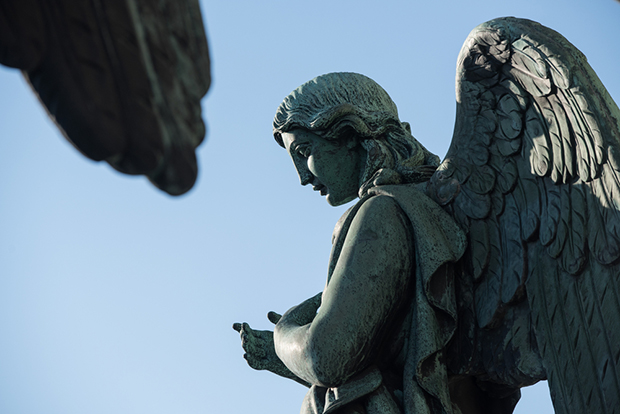
Archangel on the roof of St. Isaac’s Cathedral, St.Petersburg, Russia. Credit: Akimov Igor / Shutterstock
Since the amended blasphemy law came into force in July 2013, Russian journalists have faced a growth of religious censorship. This is according to a new study by Zdravomyslie, a foundation that promotes secularism.
Insulting religious beliefs of citizens was previously regulated by the Code of Administrative Offences and punishable by a fine not exceeding 1 thousand roubles (around $15). But after the scandal of the punk-prayer of feminist group Pussy Riot, who were sentenced to two years in jail for a performance in the Moscow’s Cathedral of Christ the Saviour in 2012, the Russian parliament adopted amendments that criminalised blasphemy.
Since July 2013, “public actions, clearly defying the society and committed with the express purpose of insulting religious beliefs” has been declared a federal crime and is punishable by up to three years in jail.
Evgeniy Onegin, a Zdravomyslie researcher, said that the imprecise wording of the law and stricter punishments have affected media freedom and resulted in a growth of self-censorship among journalists. His report Limitation of Media Freedom as a Consequence of the Law About Protection of Feeling of Believers was presented at a conference in Moscow at the end of October.
Onegin interviewed 128 employees of dozens of media organizations, including a major national television channel, radio stations, newspapers and websites. The majority, 119, said that after the revised blasphemy law came into force, managers told them not to mention religions, religious problems, traditions and “different manifestations of unbelief”. Some media organisations even prohibited usage of words “God”, “Allah” and “atheist” in headlines.
A journalist at a sports news website told the researcher that censorship had extended to idioms. For example, headlines “Hulk has talent from God” (about a Brazilian forward playing for Zenit Saint Petersburg football club) and “God’s hand helped Maradona” (about the score of the Argentinian forward at the World Cup in Mexico in 1986) were corrected to exclude the word “God”. The second headline was corrected a long time after publication because editorial staff decided to check archived articles.
Media professionals involved in a production of entertaining content also faced censorship. For example, a respondent working for a sketch show told Onegin about a ban on jokes containing phrases like “God will forgive you” or “you are definitely descended from a monkey”.
However, exceptions to the general policy of avoiding religious issues were made for Orthodox Church, which was confirmed by over the half of all respondents. For example, a journalist working for a national television channel said that her colleagues were told not to show “non-traditional for Russia religious symbols and signs”. However, the term non-traditional was not specified, so journalists started to avoid showing any religious objects, except those associated with the Orthodox Christianity.
The authors of the report presented a list of the most undesirable topics, which according to the respondents are potentially violations of the law. First place went to protest actions against the Orthodox Church (according to 84% of respondents), the second was atheism and unbelief (49%) and third place was coverage of religious events (23%).
Journalists also gave Onegin examples of when they were told not to cover stories: cancellation of celebration of Labour Day because of a coincidence with the holy week of Orthodox Lent; cancellation of performances of the Cannibal Corpse rock group due protests by Orthodox activists; protests of Orthodox activists against Leviathan, a movie by Andrey Zvyagentsev; cancellation of an Lord of the Rings-related Eye of Sauron installation on a Moscow tower a critical comment by an Orthodox priest.
The researcher came to conclusion, that the new blasphemy law and political, social and cultural conditions formed around it “have had a serious impact on media organisations, limiting freedom of speech and indirectly turning them into an instrument of a dominating religious organisation – Russian Orthodox church” and prevent audience of Russian media from getting an objective picture of civil society.
However, pressure on the press in Russia comes from other religions too. In January 2015, tens of thousands people gathered at a rally against French magazine Charlie Hebdo’s cartoons of the Prophet Mohammad in Grozny, the capital of predominantly Muslim Chechnya region. Kremlin-backed Chechen leader Ramzan Kadyrov not only accused European journalists in “insulting feeling of believers”, but also threatened those in Russia who supported Charlie Hebdo, including editor-in-chief of Echo of Moscow radio station Alexey Venediktov and former oligarch and vocal Kremlin critic Mikhail Khodorkovsky.
Earlier, the Chechen prosecutor’s office opened one of the first cases under the article 148 of Criminal Code, the renewed blasphemy law. In April 2014, a user of Live Journal was accused of “negative comments, expressing clearly disrespect for society and containing insulting remarks against people practicing Islam”. It was one of a few blasphemy cases that were opened in 2013-2014. However, in 2015 the use of article 148 of Criminal Code has stopped being a rareness.
In February 2015, another citizen of Chechen Republic was accused of insulting feelings of believers by posting a video on social networks. Also in February, the Investigative Committee began an initial inquiry into Tangazer opera staged in Novosibirsk theatre. In March, the first blasphemy case was opened in Ural region. In April, a user of the largest European social network, the St Petersburg-based VKontakte, was accused of insulting feelings of believers in his comments. At the end of October, VKontakte MDK was blocked by a St Petersburg court decision because it contained content that “insult feelings of believers and other groups of citizens”.
The imprecise wordings of the law and a wide range of its possible interpretations has arisen concerns of human rights activists. The several online campaigns were started to collect signatures under a petition calling for a repeal of the blasphemy law, but all of them failed to gain more than two thousand signatures.
This is one of a series articles on Russia published today by Index on Censorship. To read about the difficulties faced by Russia’s regional media in the face of growing political power, click here.
25 Apr 2014 | Digital Freedom, News and features, Russia
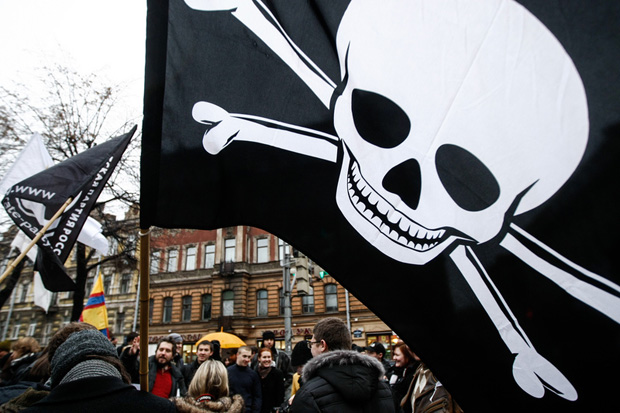
A 2012 protest against internet censorship in St. Petersburg (Image: Mike Kireev/Demotix)
It’s been a bad week for the internet in Russia. On Monday, the founder and CEO of VKontakte — “Russian Facebook” — claimed to have been pushed out and that Putin loyalists are now in charge of the site. On Tuesday, the Duma adopted controversial amendments to an information law, targeting bloggers. On top of that, on the same day, opposition figure Aleksei Navalny was found guilty of slander over a Twitter post.
Pavel Durov said in a statement on Monday that not only had he been fired from VKontakte, but he had learned about it from the press. He added that Kremlin loyalists Igor Sechin and Alisher Usmanov now had “complete control” over the social network, and that “Probably, in the Russian context, something like this was inevitable”. He revealed in an interview with TechCrunch that he’s left Russia, and has no plans to come back — labelling the country “incompatible with internet business at the moment”. VK, as it is known, is not the go-to platform for political expression, its users are generally quite young. However, the site has recently found itself in the spotlight of President Vladimir Putin’s regime, both over groups and accounts connected to the ongoing conflict in Ukraine, and, Durov claims, over Navalny‘s page.
Meanwhile, claimed to be a counter-terrorism measure, the new law forces any site with more than 3,000 daily visitors to register with authorities. It will then be considered a mass media outlet, with the potential of being subjected to blocking and fines for anything from failing to verify information posted, to using curse words. Bloggers could also be held responsible for comments posted by third parties on their site, while anonymous blogging may or may not be banned. If enforced, it would “curb freedom of expression and freedom of social media, as well as seriously inhibit the right of citizens to freely receive and disseminate alternative information and express critical views,” said the OSCE Representative on Freedom of the Media, Dunja Mijatovic.
While the amendment has yet to be signed into law, it appears to have already made an impact. Russia’s biggest search engine Yandex has removed its ranking of the country’s most popular bloggers, saying it is because the blogsphere has peaked and is losing ground to social media as a discussion platform. Incidentally, their decision was announced only days before the Duma representatives made theirs.
But these cases are merely the latest chapters in the ongoing saga of Russian internet censorship. While to some extent, the authorities have kept an eye on the internet since its inception, there was a time not long ago when their attention was firmly fixed on controlling the traditional media. But as TV news turned into little more than government propaganda machines (see the bizarre spectacle that is RT) Russians started looking for alternative platforms for real debate. Unsurprisingly, they found them on the internet, and it proved a relatively free space. The remarkable popularity of blogging site LiveJournal in Russia is one result of this; the rise of independent online news providers like Lenta.ru another.
But even then, there were those who realised the regime would turn its attention to the internet as soon as it clocked onto its potential power. And sure enough — the wave of internet repression we’re seeing today is widely believed to have started with the protests surrounding the elections securing Putin’s third term in power. Like the Arab spring, here too the internet was an effective organising tool.
Since then, continuous blocking and takedowns have been supplemented by more large-scale crackdowns, like the 2012 blacklisting of websites, and the range of attacks on online news sites, such as Lenta.ru, TVRain and Ekho Moskvy, early this year. And while there are immediate and obvious effects of putting government loyalists in powerful media positions or simply shutting down outlets that show any sign of dissent from the official line, these actions also pose less overt threats to free expression.
“We should understand one thing — while technically these initiatives look not very sophisticated, in fact the entire strategy is very efficient because it provokes the rise of self-censorship among users, ISPs and even global platforms,” renowned Russian investigative journalist Andrei Soldatov explained to Index. “Many are becoming more and more cautious facing government pressure on the internet, not very predictable, and thus extremely dangerous.”
There is little reason to believe that authorities will call it a day with their latest moves. “Every time we wonder, is it possible to have more propaganda and more pressure, but then it turns out it is possible,” Tonia Samsonova, a correspondent for Ekho Moskvy and TVRain told Index. She says people used to believe they lived in a free society, or one that was on its way to becoming free, but then the situation deteriorated. And every time they think they’ve hit rock bottom, “someone is knocking from the underground and we realise we can go lower and lower and lower in terms of freedom,” she says. “And I think there is a lot of room for making things worse for internet freedom in Russia.”
Soldatov believes a possible next step involves forcing the likes of Google and Twitter on to Russian soil: “It’s very probable, given that some prominent Russian MPs already started putting global platforms under pressure (using as pretext the protection of personal data of Russian citizens against NSA espionage). The very last initiative was to forbid Facebook in Russia until the company relocates its servers with Russian citizens data on Russian soil, notably in Siberia, because it might help develop this region.” This initiative has not yet been made into a draft bill, but Soldatov says “the trend is quite obvious”.
Indeed, on a related note, recently passed legislation orders websites — including foreign ones with Russian users — to keep six-month records of user activity, and for that to be made available to the authorities. Whether big internationals like Facebook will comply when challenged remains to be seen.
“Their ultimate goal is to have no oppositional thinkers posting,” says Samsonova. With few signs of widespread public opposition to the authorities’ previous repressive moves, further erosion of internet freedom on the path towards this goal seems likely.
This article was posted on 25 April 2014 at indexoncensorship.org
14 Apr 2014 | News and features, Russia
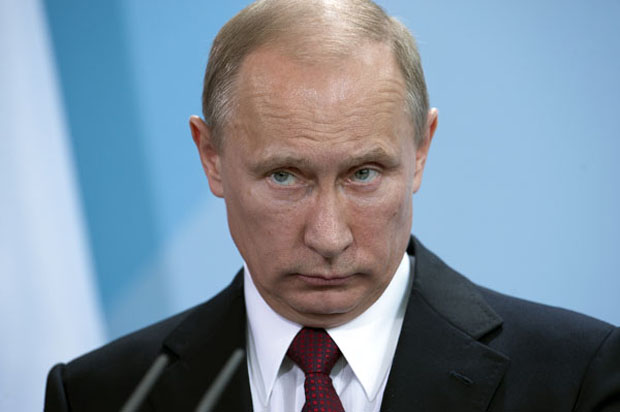
(Image: /Demotix)
Censorship of anti-war sentiment in Russia now uses a mixture of state-sponsored media attacks, arms-length loyalists, crooked think tanks and legal strong-arming – but is it working?
Politonline, a website well-known for its support of Putin, has produced an article with the top twenty most “negative” news sources in Russia. Editors claim to have pioneered a methodology which can gauge “emotional sentiment and tone” in online articles. Politonline don’t elaborate on how the algorithm has been put together, or indeed the source data they used. However some of the keywords used have been published, including the words “annexation” and “support for Crimea.”
Meanwhile, a prominent academic has been publically slammed by a pro-Putin think tank, in a pro-Putin newspaper, after he compared Hitler’s strategy in Anschluss with the annexation of Crimea. Professer Andrei Zubov was also dismissed by his employers – the Moscow Institute for International Relations. The Institute for Democracy and Co-operation, the think tank who critiqued the article, included a list of American academics who had lost their jobs over their political views – although many had been fired for comments which were overtly racist, sexist, or incited hate.
The man who blew the whistle on Putin’s invasion in Crimea, Lev Shlosberg, has also been targeted by his opponents. Some of the masked paratroopers now in Crimea were originally based in his home region : Shlosberg helped alert the media when the invasion began. A legislator and newspaper editor, he has since been accused of being a “fifth columnist” and “traitor.” In an interview on the Russia 1 television channel, Putin’s press secretary Dmitri Peskov adopted a similar strategy when he smeared dissenters as “professional critics” and a “nano-fifth column.”
Alexey Navalny, a lawyer, blogger and pro-reform opposition politician has also faced penalties. A lengthy article he published on his blog regarding Crimea prompted authorities to accuse him of breaking the terms of his house arrest. Authorities then blocked access to the site, and warned citizens that anyone promoting his article online would be subject to unspecified sanctions.
Protesters brave enough to go on the streets are also being met with state-sponsored aggression. Tanya Lokshina, Russia Program Director and Senior Researcher at Human Rights Watch, told Index that “anti-war protesters have been subject to arbitrary detention, harassment, intimidation, and even physical attacks.”
Between February 21st and March 4th, the NGO allege that police detained well over a thousand peaceful protesters in Moscow alone. Courts ordered at least fifteen of them to serve ten days of administrative detention for alleged failure to obey police orders, and fined dozens of others for participating in unauthorized public gatherings. The majority are still awaiting administrative court hearings. Other cities have seen similar policing tactics and unfair judicial process.
“Many wondered what a post-Sochi crackdown might look like,” Hugh Williamson, Europe and Central Asia director at Human Rights Watch told Index. “These detentions, the crackdown under way on the media, and violent attacks against dissenters by unidentified assailants paint a stark picture of what is going on in Russia right now.”
So is all this working? In December, Putin’s popularity was at its lowest since 2000, according to a report on the Reuters website. Polling conducted by the Levada Agency showed that “61 percent of respondents voiced approval for Putin’s performance in November, down from 64 percent in October and the previous low this year of 62 percent, recorded in January.”
It’s also notable that before the Crimea crisis escalated, the Russian people were indifferent to Euromaidan. Another Levada poll showed that 63% of Russians didn’t sympathise with either Yanukovych or the protesters.
However a poll by VTsIOM, conducted in March after troops had moved into Crimea, showed that Putin’s approval ratings had leapt up. VtsIOM is state-run but according to Russian politics analyst Mark Adomanis, “remains one of the most widely respected polling outfits in Russia.”
Crimea has sent Putin’s poll numbers skyrocketing,” says Adomanis, who writes a column for Forbes about Russian politics and economics. “Levada currently has him at a little over 80%, his highest level since 2010.”
“Other agencies have shown a similar rebound in his numbers – pretty much everyone agrees that the poll numbers are the best in a long time.”
Adomanis also commented on the lack of media, political and academic freedom surrounding the Ukraine crisis.
“Even in democratic societies there’s always a concern that polling can be heavily influenced by the nature of media coverage. It’s definitely more of a concern in Russia, given the heavy-handedness with which the authorities manage the press
“You can’t totally separate the biased coverage from popular support, but I don’t think one can fully explain the other.”
So Putin’s strategy in Crimea has played out well politically. It’s hard to know what the polls would have been like had the press been able to fully criticise his actions, or had street protests been allowed to go on unhindered. It’s also likely that the long-term economic impact of the annexation will be great enough to push polls down again in the future. However, the tactics used by the authorities to keep dissent out of the public psyche appear well-rehearsed and difficult to counter. A quick review of any Russia Today bulletin, compared with multiple on the ground sources in Kiev, Crimea and eastern Ukraine, reveal that the Russian public are not getting the full picture about their leaders international transgressions.
This article was published on April 14, 2014 at indexoncensorship.org
26 Feb 2014 | Europe and Central Asia, News and features, Russia
1. The fifth ring malfunction
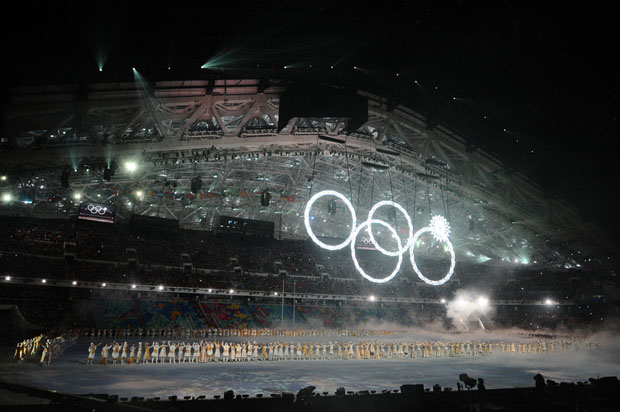
(Image: Jaroslav Francisko/Demotix)
The lighting rig which proudly illuminated one less Olympic ring than it should have caused considerable embarrassment for the Russian organisers of the opening ceremony, as Sochi 2014 opened its gates to the athletes. Known as the “stubborn snowflake” Russian viewers at home were greeted with footage from the Opening Ceremony rehearsal, so they were none the wiser. The Russians later showed their funny side by only featuring four rings in the Closing Ceremony performance.
2. Pussy Riot getting whipped in the face
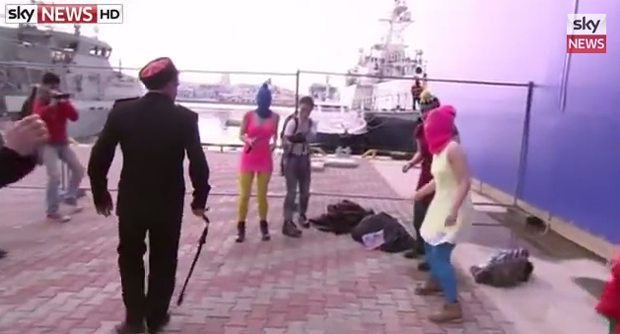
(Image: Sky News/YouTube)
While pre-emptive arrests meant many activists were unable to protest at all, five members of the punk group Pussy Riot and their cameraman were attacked by Cossack security patrols as they performed under a sign advertising the Winter Olympics.
Footage showed Cossack security staff whipping band members, pulling off their ski masks, and throwing them to the ground.
Russian deputy prime minister Dmitry Kozak dismissed the attacks: “The girls came here specifically to provoke this conflict,” he explained. “They had been searching for it for some time and finally they had this conflict with local inhabitants.”
While the international media covered the face-whipping incident in fairly minute detail, Russian press clippings about the arrest are hard to come by. Pussy Riot’s previous stunt in Moscow’s main cathedral, which landed them with a jail sentences and heavy fines, have already been scrubbed from the internet.
3. Justin Kripps’ website
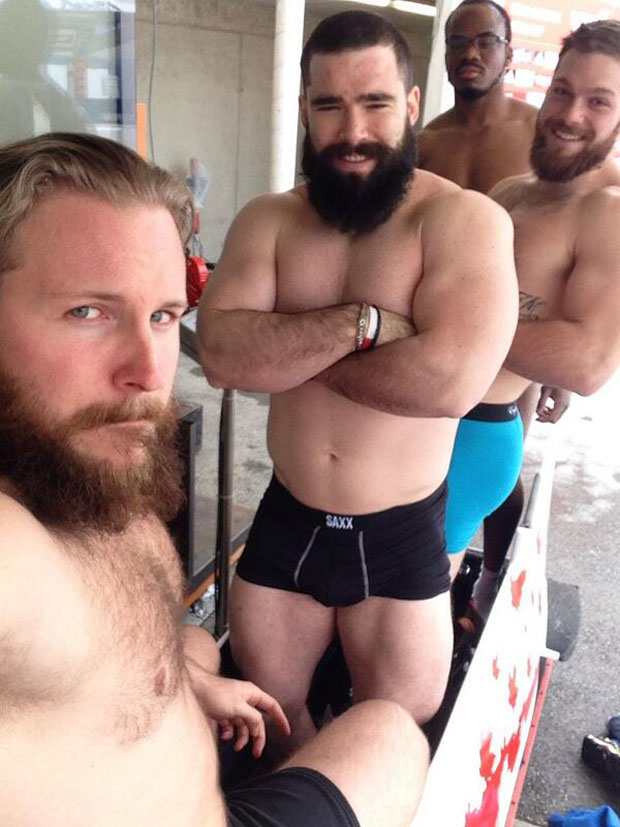
(Image: @justinkripps/Twitter)
Russian fans hoping to keep updated by the Canadian bobsleigher’s website were disappointed, as Russian censorship authorities blocked access to it. It’s still unclear why, but it may be linked to a risque photo Kripps tweeted a month prior to the Games. The snap featured his burly four-man bobsled team in their underwear at a weigh in. The photo went viral, in particular within the gay community.
4. Almost every story about corruption, gay-bashing, forcible evictions and the environment
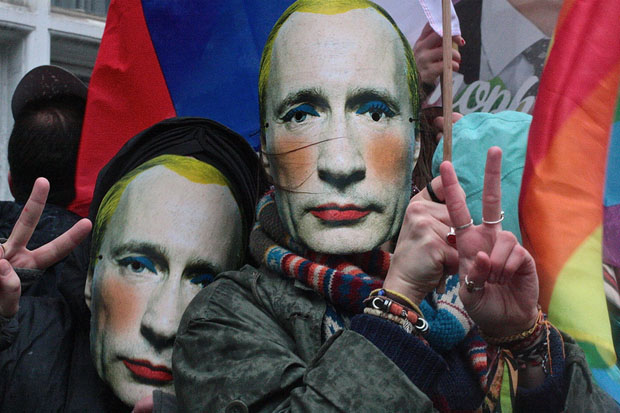
(Image: Heather Blockey/Demotix)
While the run-up to Sochi might have been dominated by negative stories in the Western media, with tales of homophobia, corruption and environmental destruction, local journalists had to be a lot more cautious when reporting the “true” face of Sochi. Strict surveillance measures were imposed on all journalists’ emails, social media and internet use – to keep any negative stories from breaking.
“It seems to me that some of these surveillance measures were conscientiously made public … to send a message,” commented investigative journalist and security services expert Andrei Soldatov while at the Games.
Self-censorship, he says, has become a “big problem” among local reporters and investigative journalists – who often felt scared to report on the wider political context of Putin’s games. “There are some fears that Sochi was a test ground … these kind of measures may be made commonplace in other parts of Russia,” he added.
BONUS: And…Russians accuse US of censorship and malicious media bias
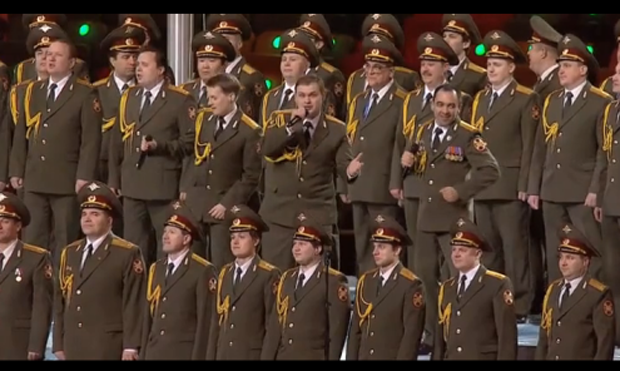
(Image: Screenshot)
Censorship during NBC’s coverage of the Opening Ceremony included missing out a live performance by girlband t.A.T.u, omitting a Russian police choir performing Daft Punk’s “Get Lucky,” deleting Communist-themed vignettes, and failing to air a congratulatory speech by IOC chief Thomas Bach, praising the Russians. Russian media whooped with glee when the hashtag #NBCFail started trending on Twitter in response to the censorship.
American magazine The Nation published a rare honest analysis of the American media’s vitriol against Russia, noting that even before the Games began, the Washington Times had written off the venues as a “Soviet-style dystopia” and warned in a headline, “TERRORISM AND TENSION, NOT SPORTS AND JOY.”
Provocative BuzzFeed headlines like “Photographic Proof That Sochi Is A Godforsaken Hellscape Right Now” and the Twitter account @SochiProblems, provoked outrage in Russia. One Russian netizen took such offence with @SochiProblems that he travelled to London and created his own photo tour of the city “in Sochi style”. “The Other Side of London, where the guided tours don’t go” is a depressing trip through some of London’s worst outer districts. The results (translated from Russian) make for sombre viewing, tinged with humour.
The infamous double toilet in Sochi also has a doppelganger in London, as one Russian Instagram user, living in the capital, proved. The side-by-side facilities, identical to the toilets which athletes had endlessly mocked in the Olympic village, were installed in a typical upmarket hipster cocktail bar.
This article was posted on 25 February 2014 at indexoncensorship.org








